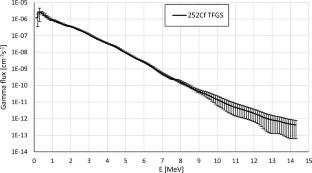Measurement of total fission gamma spectrum of 252Cf(s.f.)
Abstract
The paper presents a first comprehensive measurement of the total fission gamma spectrum (TFGS) of 252Cf(s.f.) spanning an energy range from 0.2 to 14.3 MeV using stilbene scintillator spectroscopy. The measurement was performed with the 252Cf(s.f.) source placed in a flexo-rabbit ending, with a stilbene detector located at a distance of 100 cm from the source. The room effect was determined by separate measurement with a 50 cm long lead shielding cylinder placed between the source and the detector. The obtained spectrum was corrected for the effect of the 252Cf source structural parts and the flexo-rabbit ending, using correction function obtained by simulation with the MCNP6.2 code. The main benefit of this independent measurement is the wide energy range, from 0.2 up to 14.3 MeV, in a single experiment, whereas existing measurements typically cover narrower intervals. The knowledge of the TFGS is crucial for various applications involving 252Cf(s.f.) sources, including the design and analysis of nuclear systems, the validation of nuclear data, and the estimation of radiation in the nuclear medicine. The comparison of TFGS with the recently evaluated 252Cf(s.f.) prompt fission gamma spectrum (PFGS) indicates that delayed gammas may contribute above 2 MeV up to the highest energies; the current assumption was that delayed gammas contribution above 2 MeV was negligible.


 求助内容:
求助内容: 应助结果提醒方式:
应助结果提醒方式:


